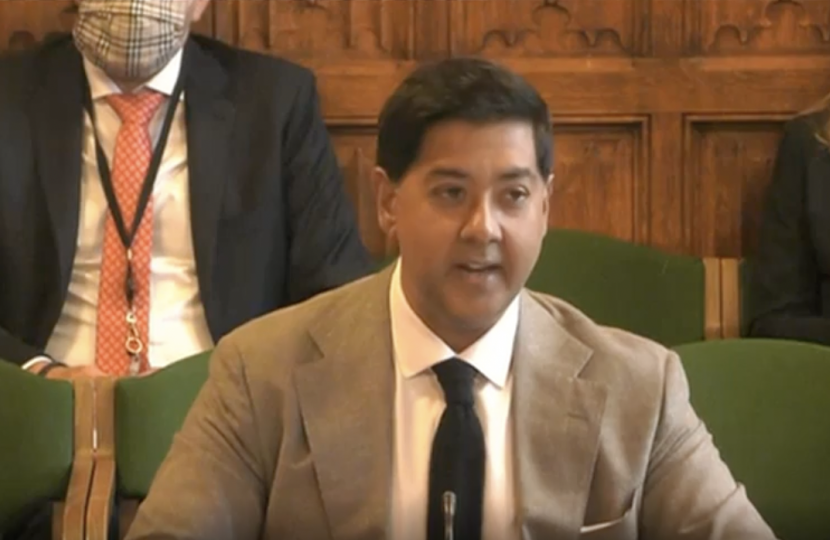
Dean Russell MP: I want to touch on a couple of points. Right at the start you gave three examples of big issues, anti-vax being one of them, and the awful incident in the capital in Washington. How are these connected? Are you finding that the same organisations are spreading misinformation in different ways to the same groups of people and perhaps trying to widen their audience?
Imran Ahmed: The serious part of the job, where we talk to counterterrorism in the US and the UK, is convergence and hybridisation of these forces. The problem with social media is that there is zero marginal cost for each additional communication to each additional person. The actual fundamental technical change to how communications happen and the economics of it are enormous. It is like the nuclear bomb. It is unlimited amounts of energy from zero. If you can communicate to theoretically 4.5 billion people for zero cost, you are able to market to new groups. What we have seen over the pandemic is the cross-marketing of different types of extremism to each other. That leads to convergence.
On 6 January, we had a stage which had anti-vaxxers; the Oath Keepers, the far-right white supremacist group; George Papadopoulos; Roger Stone—a whole array of bad guys on that one platform. They had converged in physical space after initially converging and marketing to each other, realising that there was an opportunity to sell the same idea that you cannot trust the Government, that they are out to get you, that there is a great big conspiracy. What we are seeing now is hybridisation. Once you form these converged new organisations, you see mega conspiracies being used to hybridise them. QAnon brought together suburban mums with white supremacists, 17 with Trump supporters, with people who were just worried about children—with a whole array. The new one is the Great Reset, which is replacing QAnon—QAnon is basically dead—replacing the paedophile weirdness and Donald Trump being the world’s greatest paedophile hunter with the idea that the vaccines are being used to kill people. That is the Great Reset conspiracy theory, which is now the mobilising conspiracy theory behind the eruptions of violence that we are seeing in real life today.
Dean Russell MP: You mentioned earlier the huge amounts of money that are funding these conspiracy creators, as it were. Where is that money coming from? Earlier, you said bad actors, and you mentioned charities and business. Interestingly, you did not say Governments. Is there a bigger issue here to do with security globally?
Imran Ahmed: We do not do government work. We are not a quasi, semi or in any way espionage agency. We do not take money from Governments either, to be very clear. Nor do we take it from big tech. We are not equipped to identify, and we are not capable of identifying, infiltration by Governments. Part of the reason for that is that the people who have access to IP-level data, which you would need to understand and look at masking, for example, are the companies themselves, and they have teams internally to do that. Part of the reason is because it is just not our wheelhouse. There are organisations like the ISD—the Institute for Strategic Dialogue—run by Sasha Havlicek, which is an incredible organisation that is very good at that. It works with Governments, the DHS and others to do that sort of work. I have always said that it is a no-brainer. If you want to kill British or American people, the best thing you could do now, if you are a Russian tech person, is to like the posts of bad actors from within our society. It is injecting heat into an existing fissure in our society, trying to cause an earthquake.
Dean Russell MP: On the pool of people, you mentioned earlier that 60 million has been the standard number of people who follow the anti-vax conspiracy theories. I used to do a lot of work in AI and psychology AI before becoming an MP. The use of language and the way things are phrased can have a powerful impact on what people believe and their actions. Are all those 60 million people who watched “The X-Files” TV show and thought it was a documentary, or is the reality that they are swapping and changing, that the language that is being used and spread by these platforms is convincing people who previously perhaps would not have been convinced about conspiracies and about misinformation?
Imran Ahmed: Yes, and they use really sophisticated tools to bring them in. Propaganda works. There is a reason why we study propaganda. The anti-vaxxers talked, for example, about creating answering spaces, waiting for people to express anxiety and then jumping on them with a bit of misinformation, which bridges them in. The Disinformation Dozen is worth looking at for so many reasons, but one of them is that like an industry they each have a different brand and market. One of them will 18 target mums who are into yoga and wellness in California. One will target Trump voters. One will target another segment. They have both the bridging identity and the bridging arguments to draw people into extremism.
Q12 Dean Russell MP: Finally, related to that, are you finding in your Malgorithm report and so on that those algorithms are seemingly targeting more vulnerable people in society?
Imran Ahmed: If there are 60 million people across the US and the UK who are following spaces, this is not about vulnerable or not vulnerable. This is not about smart or stupid. It is not about race. Smart people are just as vulnerable to conspiracy theories for a variety of reasons, not least because they are more confident that they know what the truth is once they have worked out what they think the truth is, that they are using the evidence in front of them. Being clever is not resilience enough; you need to do some work to remove the content itself. The platforms are feeding that content in. When I am in rooms full of smart people, I always ask, “What vegetable helps your eyesight?” Everyone always says, “Carrots”. I remind them that that was Ministry of Information propaganda during the Second World War to hide the fact that we had plane-mounted radar, so we told people that we had been growing carrots and feeding them to our pilots so that they could see at night. I do this, and then my favourite thing to do is to follow up with a question: “Now that you know that that is just propaganda, will you still tell your kids to eat carrots?” and everyone says, “Yes”.
The Chair: Let us hope the kids are not listening, Imran.



